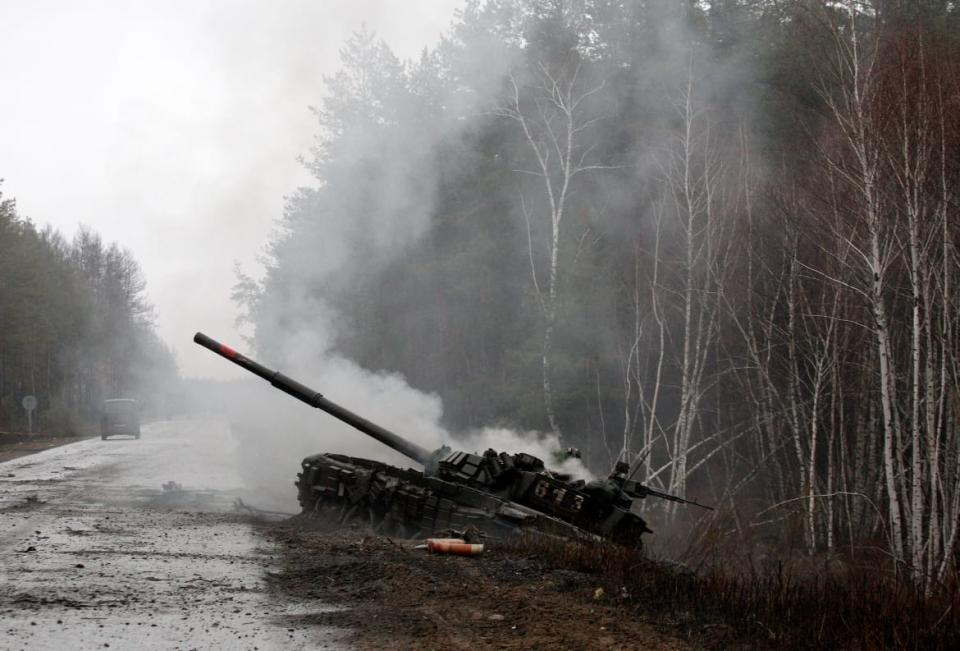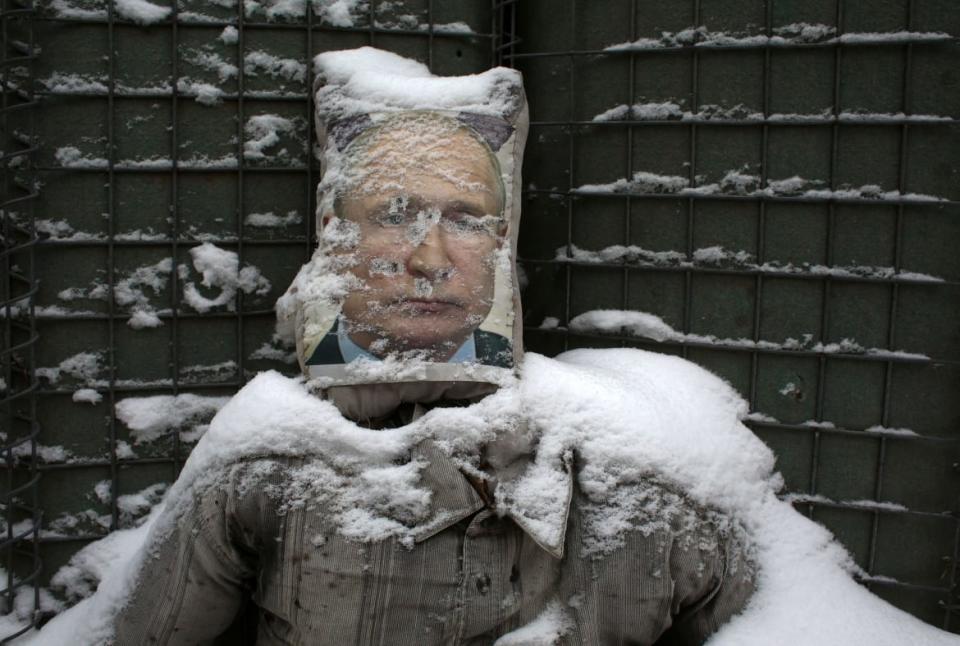Judgment Day Is Coming for Zelensky

Ukrainian President Volodymyr Zelensky and his advisers have been arguing in recent days that they don’t want to cede any territory to Russia in the ongoing war in Ukraine. And though that view is widely held in Ukraine, they could be trapping themselves in political quicksand.
Zelensky’s position, which he and his advisers have repeated countless times, is well supported throughout the country, to be sure. Ukrainians overwhelmingly don’t want to give up any land to Russia—82 percent of Ukrainians are against it, according to a Kyiv International Institute of Sociology poll conducted in May.
Zelensky has said Ukrainian fighters are capable of pushing back Russian forces, and even suggested they want to push Russia back to not just pre-February 2022 bounds, but wind the clock all the way back to before Russia’s incursion in 2014, as well.
But Zelensky and his advisers must one day confront the realities of the war and actually approach a negotiating table once more and consider—or make—territorial concessions, that could leave Zelensky on the precipice of political turmoil, according to Steven Pifer, a former U.S. ambassador to Ukraine.
“Zelensky is going to have to make some really difficult decisions between what kind of concessions to make versus protecting positions of principle, and what kind of concessions he might want to make that could be acceptable to the Ukrainian public,” Pifer told The Daily Beast. “I think that’s going to be a really, really hard decision if they get to a point in a negotiation.”

Smoke rises from a Russian tank destroyed by Ukrainian forces, on the side of a road in Lugansk region on Feb. 26, 2022.
And yet, Zelensky knows it’s a matter of when, not if, he’ll be back at the negotiating table. Zelensky said last week he thinks the war will be decided on the battlefield, but admitted eventually he will be trying to make a deal once more.
“Victory must be achieved on the battlefield,” Zelensky said. But “any war should be ended at the negotiating table.”
Early on in the war, Ukrainian officials came to negotiations with the Russians to see if some kind of peace or deal could be reached. But Zelensky’s choice to entertain the idea that Ukraine could reach a deal with Russians has been met with reproach from Ukrainians questioning his judgment.
As the war has raged on and Ukrainians have fallen victim to Russian atrocities, Ukrainians are only likely digging their heels in.
“The attitudes have hardened in Ukraine, both in the government and among the people, and so even if Zelensky wanted to make some of the concessions he might have been considering 10 or 11 weeks ago, I’m not sure that the Ukrainian population would accept that now,” Pifer said.
The consequences for Zelensky could play out in a number of ways. Politically, Zelensky’s standing has been shape-shifting since the beginning of his time in office. Before Putin invaded Ukraine in February, his domestic approval ratings were tanked. Even in the buildup to the invasion, world leaders questioned his judgment when he sought to deny the seriousness of Putin’s plans for Ukraine and didn’t call up his reserves quickly enough.
But when the war began, Zelensky met the moment, breaking out into the streets and fighting alongside his citizens. He became a people’s president.
And although he has his finger on the pulse of the Ukrainian people and the state of their resolve to beat back Russia, it’s not clear how long the afterglow of wartime political hero will last, especially when he has to start making decisions that are politically fraught in reaching a real peace. And if Zelensky even approaches a negotiating table, his political future might be shot, according to Orysia Lutsevych, the head of the Ukraine Forum in the Russia and Eurasia Programme at Chatham House.
“This could actually be the beginning of the end of Zelensky’s popularity if he goes into negotiations,” Lutsevych said. “He has a very fine line to walk when there is some kind of negotiated settlement.”

A residential building damaged by a missile on Feb. 25, 2022 in Kyiv, Ukraine.
Entering political negotiations with Russia at this point would be akin to political suicide, agreed Olena Lennon, adjunct professor of Political Science and National Security at University of New Haven.
“If Zelensky started making concessions now, he knows full well where the public opinion is and that there would be a backlash. It would be the end of his career,” Lennon said, suggesting that a class of veterans might bubble up to challenge Zelensky. “If he were to make any concessions, there would be a massive social movement against it.”
In addition to any social or political movement against negotiations, given how invested Ukrainian fighters have been in the war, and how laser-focused they are on pushing Russia out, if concessions were on the table, some kinetic fighting might continue no matter what Zelensky decides to do politically, Lennon said.
“Guerrilla warfare could become a real possibility if political leadership started making concessions to Russia,” Lennon told The Daily Beast. “Large numbers of Ukrainians have either joined territorial defense forces or enlisted in the army. Many more are armed and have military experience. So there is a very high possibility that Zelensky’s administration could be threatened in a military coup if they started making concessions to Russia.”
The Biden administration, for its part, is trying to stay out of it.
“We will not push Ukraine to make concessions, and we have consistently stated that sovereign states have the right to choose their own alliances and make their own decisions about their security,” a State Department spokesperson said. “We believe it is for Ukraine to define what it considers success.”
“We are focused on giving Ukraine as strong a hand as possible on the battlefield and at the negotiating table,” the spokesperson said.
Zelensky intimated that the successes in this war must first come on the battlefield—wins that haven’t come to fruition just yet. Just last week, Russian and Ukrainian troops have been battling over the contested and strategically important city of Severodonetsk, just the latest back-and-forth fighting that could determine the future of the war.

A poster of Russian President Vladimir Putin is used as target practice along a trench on the frontline with Russia-backed separatists near Zolote village, in the Luhansk region, on Jan. 21, 2022.
Zelensky is likely in a safe space politically now, as conversations about battles coming to a close and concessions aren’t yet on the table, said Andrew Lohsen, a former monitoring officer at the Organization for Security and Co-operation in Europe (OSCE) on the Special Monitoring Mission to Ukraine.
“Right now we’re not at a point where any sort of Ukrainian territorial concessions are in the cards,” Lohsen, a former State Department analyst, told The Daily Beast. “Until we get to a stage in which Ukraine is really facing mounting logistical problems or the inability to actually field a competent, defensive force, I don’t think we'll have much talk about territorial concessions.”
Ukrainian officials likely won’t be pushing for negotiations in the near term, because they still think they can push Russians back and are still concerned about giving Putin what might look like a reward for invading, according to Bill Taylor, a former U.S. ambassador to Ukraine who served as interim chargé d’affaires in Kyiv from 2019 through 2020.
“They don’t sound like they’re ready to have negotiations at this point,” Taylor told The Daily Beast. “They know that some Ukrainian territory can be won back on the battlefield, and they also know that some Ukrainian territory, maybe Crimea, is going to take a much longer time and they’re willing to accept, I think, that it’s going to take a longer time.”
“Negotiation at this point would lock in the Russian control over portions of southeastern Ukraine,” Taylor said. “So the Ukrainians—Zelensky and the people—are not yet willing to have this because they don’t want to, a) give up claim and, b) they don’t want to reward the Russians for invading them.”
Get the Daily Beast's biggest scoops and scandals delivered right to your inbox. Sign up now.
Stay informed and gain unlimited access to the Daily Beast's unmatched reporting. Subscribe now.

 Yahoo News
Yahoo News 